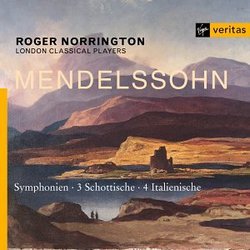| All Artists: Felix [1] Mendelssohn, Roger Norrington, London Classical Players Title: Mendelssohn: Symhonies 3 & 4 Members Wishing: 0 Total Copies: 0 Label: Angel Records Release Date: 6/6/2000 Album Type: Original recording reissued Genre: Classical Style: Symphonies Number of Discs: 1 SwapaCD Credits: 1 UPC: 724356173521 |
Search - Felix [1] Mendelssohn, Roger Norrington, London Classical Players :: Mendelssohn: Symhonies 3 & 4
 | Felix [1] Mendelssohn, Roger Norrington, London Classical Players Mendelssohn: Symhonies 3 & 4 Genre: Classical
|
Larger Image |
CD Details |
CD ReviewsLight, clear, transparent - thoroughly recommendable Leslie Richford | Selsingen, Lower Saxony | 12/20/2004 (5 out of 5 stars) "Of Mendelssohn?s five symphonies it is the Third (?Scottish?) and Fourth (?Italian?) which are most heard today, so it is perhaps not surprising that Sir Roger Norrington chose them for the continuation of his period-instrument/historical-performance-practice foray deep into the 19th century. This CD was recorded in Summer 1989 in London?s Abbey Road Studios and is all that I have come to expect from the London Classical Players: a technically clear-cut recording with strict adherence to historical detail such as the seating-order of the orchestra, the number and kind of instruments used and the tempi, which tend to be faster than those associated with classical orchestras in the late romantic tradition.
The ?Scottish? symphony (just over 37 minutes) is a glorious masterpiece, not only conjuring up the dark wildness of Scottish landscapes and its murderous history but also demonstrating the delicacy, taste and care which Mendelssohn invested in his orchestration ? no wonder that Londoners loved him when he performed there! And what a shame that his position in the musical life of Germany has been so limited simply because he was Jewish ? prejudice makes not only blind, but obviously also deaf! This is music to listen to intensely over and over again and to enjoy for a lifetime. The ?Italian? symphony (almost 27 minutes) is completely different, reflecting among other things the totally different weather and temperament encountered by the composer on his Italian grand tour. I found that Norrington took the first movement (?Allegro vivace?) perhaps just a tiny fraction too fast, bordering on presto ? but that may be because I got to know and love this symphony in the slightly slower version by Sir Charles Mackerras and the Orchestra of the Age of the Enlightenment. Both recordings offer a wonderfully light, clear, transparent Mendelssohn that I can heartily recommend. (Mackerras recorded the Italian symphony together with the Midsummer Night?s Dream Overture and extracts from the incidental music to Shakespeare?s play.) " |

 Track Listings (8) - Disc #1
Track Listings (8) - Disc #1